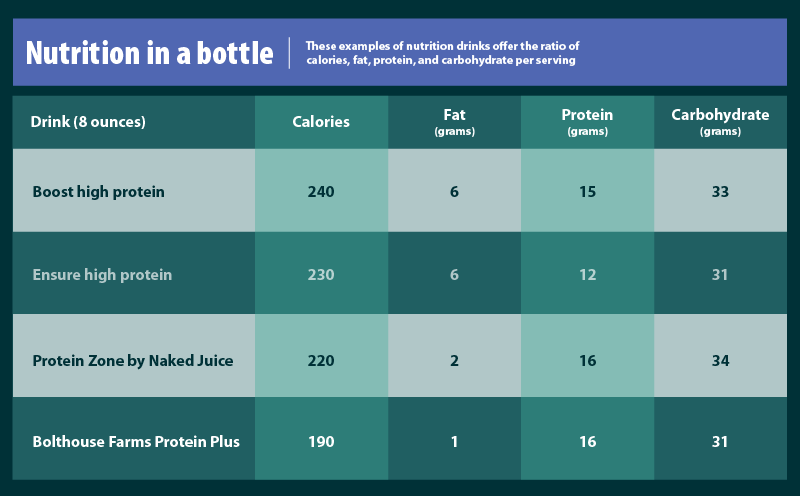
Miracle promising liquid meals and nutrition shakes aren’t always the best option for your client’s health. The danger of supplemental nutrition shakes is that they are sometimes viewed as having a lot of minerals and vitamins and think they have more value than they actually contain. These supplements were created and formulated to be an emergency replacement for a missed meal and not as a recurring meal replacement. It’s not appropriate to eat a full meal and then consume a supplemental drink because that would comprise too many calories. Supplemental nutrition shakes and drinks can be helpful for people who struggle with a loss of appetite, have difficulty chewing, have trouble preparing balanced meals, or are recovering from surgery or an illness. But these nutrition shakes aren’t magic bullets for nutrition.
The nutrition drinks
Supplemental nutrition drinks provide a healthy balance of protein, carbohydrate, and fat. There are hundreds of varieties that fall into two general categories.
Shakes, such as Boost or Ensure, are intended for oral consumption. You can find them on a grocery store shelf. These are formulated to help meet patient’s general nutrition goals such as increased calories and protein. Some nutrition shakes are designed to be compatible with health conditions such as diabetes (Glucerna). Nutrition shakes are usually fortified with vitamins and blended with sugar to improve taste.
Formulas are designed for more specific disease states such as cancer, chronic obstructive pulmonary disease, and late-stage kidney disease. These drinks can be consumed but aren’t designed to taste good and are often used in feeding tubes. Doctor’s will have to supervise use of these. Users do not need a doctor’s permission to try a nutrition shake, but it’s a good idea to ask your doctor if any of the ingredients will interfere with medications. For example, some drinks contain vitamin K, and sudden changes in vitamin K may interfere with the effect of a blood thinner or other medications.

The risk of nutrition drinks
Supplemental nutrition drinks contain more than just healthy ingredients. They may contain more sugar than any of the other ingredient. A patient who can’t eat well and that’s the only food that’s palatable, it’s better to get the calories. In that case, substituting one meal a day with a drink won’t hurt. However, patients who can still eat meals may be risk consuming too many calories by substituting the nutrition drinks. That can lead to weight gain and a list of complications associated with obesity, such as high blood pressure and diabetes.
Although weight gain can be a benefit of consuming these beverages, there are still many potential side effects of using a higher sugar source. The problem is that these drinks are very high in sugar. Consuming large amounts of sugar calories can cause the blood sugar level to spike, blood pressure to spike, and contributing to elevated blood cholesterol levels. For example, one can of Boost contains 20 grams of sugar. That’s 80% of the sugar intake recommended by the American Heart Association for women, 56% of the intake recommended for a man.
A high sugar diet can also be bad for the oral health of seniors. In seniors, who still have their teeth, it can increase their risk of tooth decay and infections. Even if a senior has dentures, a high-sugar diet can contribute to the growth of oral bacteria, increasing the risk of gum problems.
Dangers caused by nutritional drinks for seniors
You might think that a nutritional drink for seniors is a great supplement to their diet but often they are anything but healthy. For example, Ensure is made with dairy which means it comes with the side effects of lactose intolerance. Lactose intolerance can increase with age and giving a senior a bottle of Ensure can lead to diarrhea, nausea, and flatulence which will only harm their appetite.
Nutritional drinks for seniors can also interact with certain medications. The average senior takes at least five prescriptions per day. The high vitamin levels in health drinks can have a negative effect when combined with prescribed drugs or other medications. If you’re not sure if any prescriptions interfere with protein drinks, check with the pharmacy.
Also raising alarms is the fact that nutrition in a can isn’t the same as nutrition from food. Even if these drinks are fortified, they won’t contain all of the nutrients whole food.
Addressing a lack of appetite
Many utilize nutritional supplements as a solution to a common issue: a lack of appetite. One of the key problems that can lead to weight loss among seniors is a lack of appetite. There are many reasons why seniors experience a diminished appetite. Nutritional drinks seem to be a quick, viable solution to filling the void for patients. However, it is important to weigh the risk versus the benefits when using supplements. It’s important to find the root cause of the problem and address it to help seniors eat more natural foods.
Alternative option to a nutrition drink
A potentially healthier option is a blended shake or fruit smoothie that is food-based and supplied by many food vendors. These have less added sugars with a minimum of processing, and do not contain large amounts of vitamins and minerals, herbs, or other supplemental ingredients. No matter which drink you choose, look at the ingredients. Preferably, the first few ingredients should be fruit or forms of protein. If sugar is the first or second ingredient listed then there’s probably a healthier option available. Equally important are the calories. If you’re replacing a meal, look for about 400 calories per serving. Our experts advise against using the drinks as snacks, but if you can’t avoid the situation, don’t exceed 200 calories.
As for nutritional ratios in an 8-ounce serving, look for 10 to 20 grams of protein, no more than 6 grams of fat, and no more than 40 grams of carbohydrate, including sugar.
